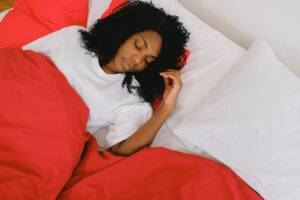4 Reasons You’ll Get a Better Night’s Sleep Without Hearing Aids
When living with moderate to severe hearing loss, hearing aids make a difference in a person’s ability to interact with peers and the surrounding world. Though sometimes it’s hard to predict when we’ll doze off, remembering to remove your hearing aids before bed can have a significant impact on your quality of sleep.
You’ll Preserve the Batteries
Taking out your hearing aids and opening the battery doors before falling asleep will help extend the lifespan of your hearing aids and save you money in the long run. In addition, removing the batteries from each hearing aid will help air them out—moisture from our bodies can lead to buildup on hearing aids that causes damage down the line. Keep your hearing aids away from any food or drink, and store them in a safe, dry place when they’re not in use. If using rechargeable hearing aids, be sure to insert them into the charger correctly, out of reach of children, pets, and humidity.
You Can Give Your Ears a Chance to “Breathe”
Just like your hearing aids, too much moisture in your ears can lead to issues. Your ear canal needs air circulation since it’s lined with skin—removing hearing aids at night will let this skin “breathe” and receive the circulation it needs. Before putting your hearing aids away as you prepare for bed, you should take time to clean them to remove any earwax residue.
You’ll Wake Up Without Sore Ears
Sleeping in hearing aids is uncomfortable and sometimes even painful. Lying on your side with behind-the-ear hearing aids will probably make your ears hurt in the morning. Completely in canal hearing aids should be removed but talk with your audiologist about appropriate care practices. The only hearing aid designed to be slept in is the Lyric completely invisible hearing aid.
No More Middle-of-the-Night Microphone Feedback
Sleeping in your hearing aids can actually create feedback noise and disturb your sleep. If you lie on your side while your hearing aids are in, the microphone could get covered. This forces the sound back into the speaker and creates an annoying, whistling feedback sound.
What If I Accidentally Fall Asleep With My Hearing Aids In?
Sleeping in your hearing aids isn’t immediately harmful to your health, but you should make a habit of removing your hearing aids before going to bed. If you’re worried you won’t hear your alarm clock in the morning or miss an emergency phone call, you can make adjustments via accessibility features on your smartphone if you have one. You could also invest in an alarm clock that mimics sunlight to wake you up, or if you have a smartwatch or fitness tracker, you can adjust vibration settings for your morning alarm.
Work With Our Hearing Aid Experts
If you’re still getting used to your hearing aids or are looking for professional care to treat your hearing loss, the audiologists at Associated Hearing Professionals have decades of experience serving the St. Louis area. Our team has over 70 years of combined experience, and we can provide thorough evaluations to help determine if you need hearing loss treatment. Schedule an appointment today to receive a comprehensive hearing test at one of our clinic locations in St. Louis or Chesterfield, MO.

